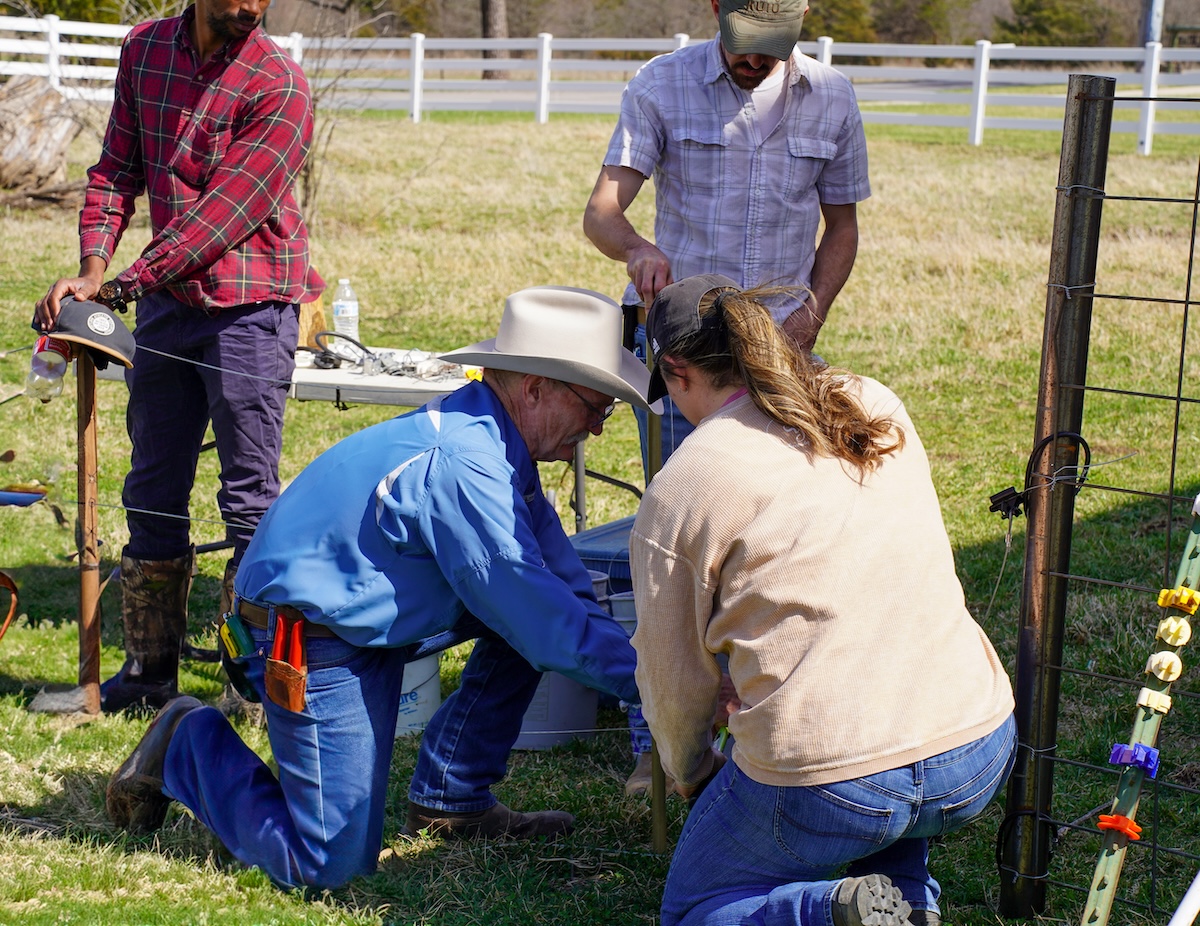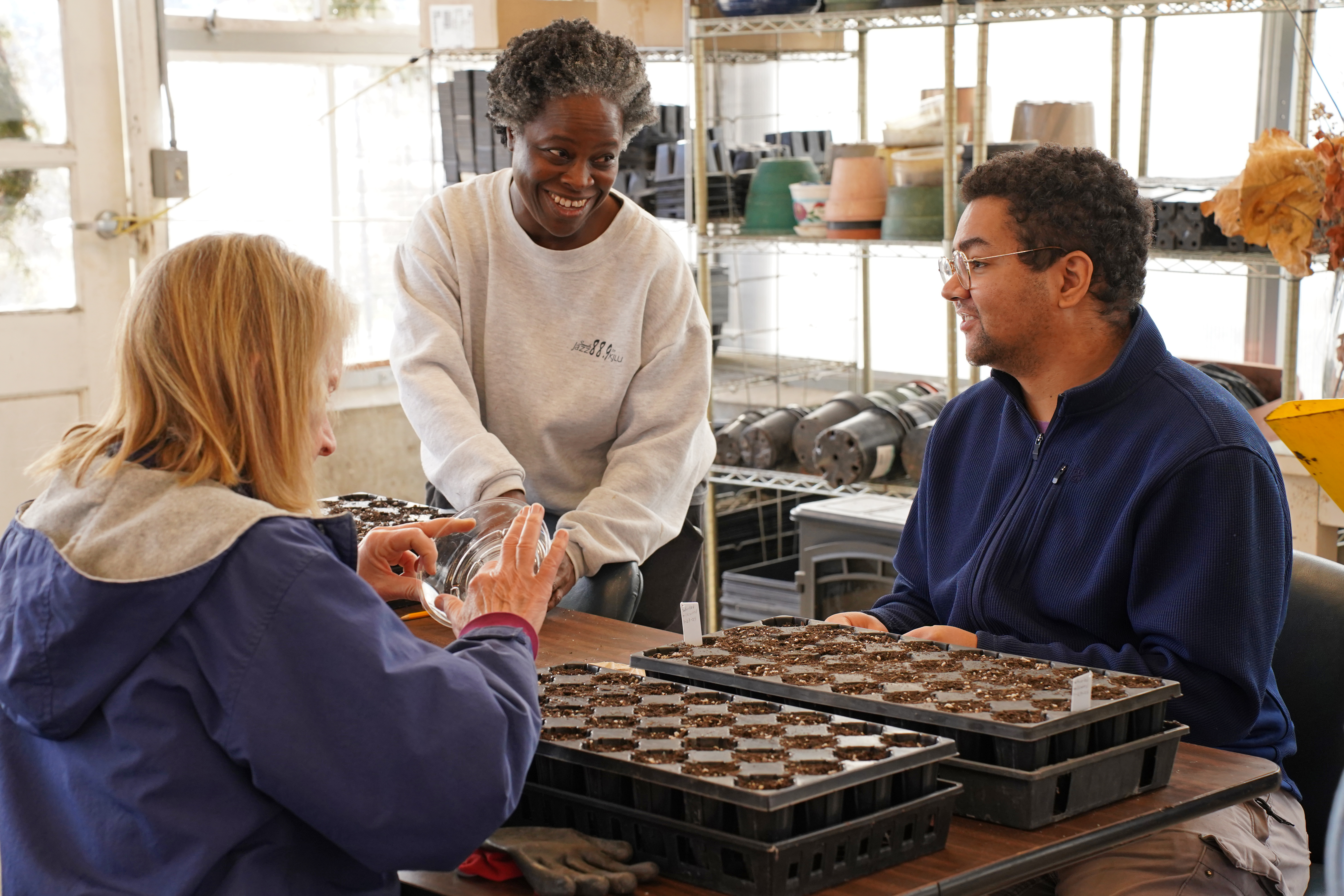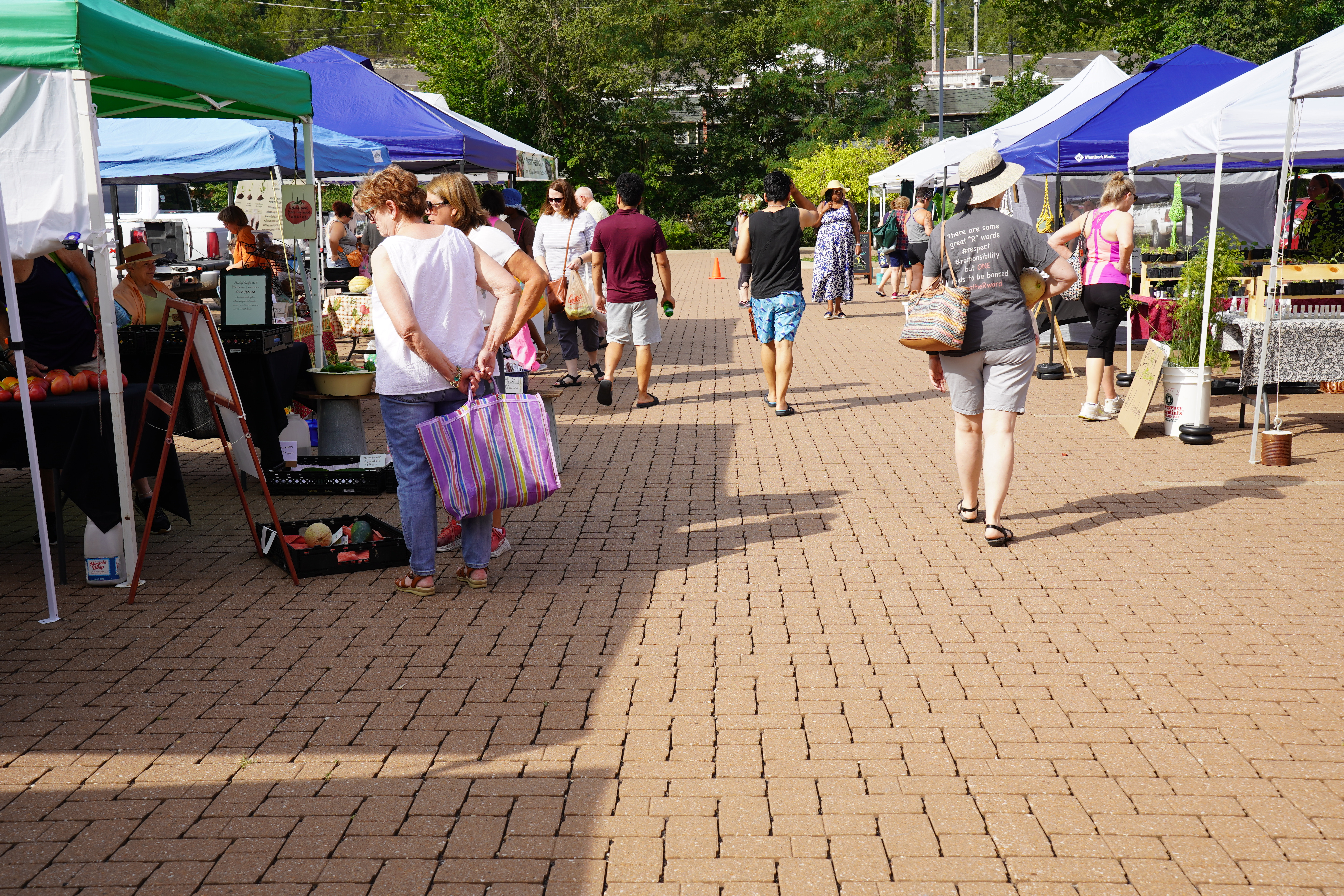Lincoln University Programs Provide Education, Support and Opportunity
Office of Communications and Marketing
Young Hall
820 Chestnut Street
Jefferson City, MO 65101
 Mark Green leads a hands-on practice demonstration of permanent fencing installation at a Lincoln University Cooperative Extension training event.
Mark Green leads a hands-on practice demonstration of permanent fencing installation at a Lincoln University Cooperative Extension training event.
Empowering farmers and their communities is a pursuit at the very core of Lincoln University Cooperative Extension (LUCE).
Through a bountiful assortment of programs, workshops and events organized by specialists, LUCE supports producers with the resources and support they need to be successful and provide for their communities.
Those benefits are available to growers and consumers across the state.
In March, Dr. Nadia Navarrete-Tindall, a Lincoln University (LU) professor and LUCE Specialty Crops specialist, held a workshop on native fruit pruning at the FINCA EcoFarm in Haywood City, MO. Navarrete-Tindall said approximately 20 people attended, about half of whom were farmers.
She and other Extension staff gave attendees a tour of the farm and taught them about pruning and fruit tree maintenance. They also discussed how native plants can serve as resilient alternative crops in the face of environmental and climate challenges.
“It was like a field day and everybody was really excited,” Navarrete-Tindall said. “The people who come to our workshops are really passionate, and they’re interested in learning more about native plants.”
Attendees learned how to identify native fruits, how to grow them and all the things they can do with the harvest — that could be preparing the raw fruit, baking cookies, making jam and more.
“One purpose of these workshops is to give ideas to people on how to make a potential income with small farms,” Navarrete-Tindall said.
Navarrete-Tindall said they discussed the importance of pollinators, shared ideas on how to improve production and highlighted the nutritional value of native plants and fruits.
The workshop also allowed returning attendees to see the fruits of their labor.
 (From left to right) Marsha Hayes, Clara Bryant and Eze Pojmann plant seeds during a workday at Lincoln University’s FINCA EcoFarm in January.
(From left to right) Marsha Hayes, Clara Bryant and Eze Pojmann plant seeds during a workday at Lincoln University’s FINCA EcoFarm in January.
Navarrete-Tindall explained that years have passed since the last workshop at the Haywood City FINCA EcoFarm. She said it was exciting to see how the persimmon trees planted back in 2013 have grown considerably and even started producing fruit.
She and other specialists plan to return for the harvest of the fallen persimmons.
Navarrete-Tindall said workshops like this provide opportunities for people to create a good environment. By surrounding themselves with native plants, they can provide nutritious food for themselves and their communities and make money. She added that she hopes more people will attend future workshops and adopt the practices she teaches.
The expertise of Lincoln’s specialists spans a wide range of subjects, from small ruminants to cover crops. While Navarrete-Tindall and her workshops focus on native plants, other experts, such as Dr. Waana Kaluwasha, set their sights elsewhere.
Kaluwasha is an assistant professor of plant pathology at LU. She works in Lincoln’s Plant Pathology Lab, researching plant diseases and how to treat them.
She led a learning circle in April to teach growers and specialists about soilborne pathogens, following a previous workshop on diagnosing vegetable diseases.
For this event, Kaluwasha said she wanted to avoid simply lecturing attendees. Instead, she opted for a learning circle approach — a more interactive method with hands-on learning opportunities and discussions between participants.
Kaluwasha said she hoped to make people aware of diseases transmitted through soil. She explained she focused on soilborne pathogens because they are both common and severe in Missouri.
“If we can increase our awareness of what diseases farmers should look for and how to diagnose [those diseases], they can reach out for help before it spreads to other crops or fields, which may save farmers in the long run,” Kaluwasha said.
She added that soilborne pathogens can persist in soil for years and remarked how devastating losing crops to disease can be for farmers’ livelihoods.
While plant diseases can be treated, Kaluwasha noted it is far more effective for growers to be proactive and prevent disease spread in the first place. Creating a disease management plan is critical to prevention — a topic attendees discussed at the learning circle.
While the focus of the session was educating growers, Kaluwasha said she also viewed it as a “train the trainer” type of event. She explained she wanted specialists who attended to take what they learned and share it with their home communities.
In addition to her workshop, Kaluwasha and the LU Plant Pathology Lab help farmers by identifying diseases in plants sent by growers. This furthers the lab’s research while helping farmers determine what might be affecting their crops.
“I know small farmers can’t always afford to send samples to a diagnostic clinic where they might be charged," Kaluwasha said. "We’re always happy to look at samples and try to help."
Beyond workshops and learning opportunities, Lincoln supports farmers and producers in other ways — one notable example being the Lincoln University Farmers Market, an offshoot of the Specialty Crops Program.
 Shoppers browse the produce and other goods sold by vendors at the Lincoln University Farmers Market in Jefferson City.
Shoppers browse the produce and other goods sold by vendors at the Lincoln University Farmers Market in Jefferson City.
“The most obvious way of empowering farmers I can think of is giving them a place to sell their goods,” said Market Manager Sage Jakobi. “There’s nothing quite as empowering as making a profit off something you grew in your own garden.”
The Farmers Market gives local growers, small and large, the chance to sell their crops and products, filling the gaps left by other providers.
“Now more than ever, community is what’s needed," Jakobi said. "Farmers Markets are there to provide a healthy community for people and offer people goods, products and produce that may be more expensive or harder to find elsewhere."
Jakobi added that the market acts as a medium for vendors to connect, building a network of support and commerce.
“One of the biggest things about empowering any community is connection, and we offer that through the Farmers Market,” Jakobi said.
He said the spring market typically draws around 20 to 30 vendors, while the winter market sees about half that number due to its less frequent schedule and shorter hours. All vendors, unless otherwise approved by Jakobi, reside within a 50-mile radius, meaning the market is primarily supported by local producers.
Currently, Jakobi added, the biggest group served by the market is locals — specifically suburban residents. Lincoln hopes to extend that service to help its student body more, while still finding new ways to serve residents.
He said plans to partner with LU’s food pantry are underway to help bring more students to the Farmers Market and support vendors in accepting food stamps.
“We’re in the process of making the market more inclusive — that is the mission of the market in the first place,” Jakobi said.
Starting in May, the Spring Farmers Market will be open every Saturday from 8:30-11:30 a.m.
Lincoln’s offerings for farmers and their communities are plentiful. Native fruit pruning workshops teach growers how to maintain fruit trees and improve production, and soilborne pathogen learning circles teach farmers and specialists how to identify, diagnose and treat plant diseases. Meanwhile, the Farmers Market allows producers to profit from their hard work while providing nutritious food and goods to their community.
Besides these examples, various workshops and learning opportunities occur year-round, covering topics such as chicken coop construction, hen management, native edible plants and more.
To find an event that interests you, visit LU’s calendar at https://www.lincolnu.edu/events/index.html.
And, LUCE services go beyond scheduled events. Extension specialists — whether they’re experts in pest management, assisting small farmers, specialty crops or other areas — are always available to help and support growers and producers one-on-one and in group settings.
Specialists operate around the state, be it the Bootheel, central Missouri or an urban area.
Find a specialist in your area by visiting https://www.lincolnu.edu/cooperative-extension-and-research/cooperative-extension/faculty-and-staff.html.
